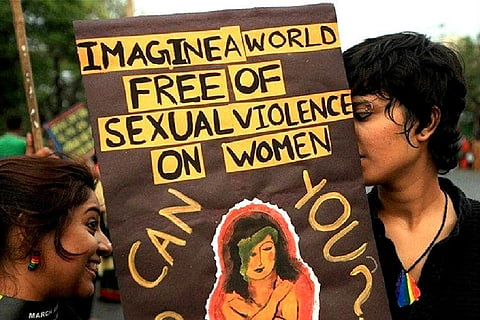

The Supreme Court on Friday dismissed a PIL which sought to make laws concerning rape, sexual harassment, stalking, voyeurism, ‘outraging of modesty’, etc. gender-neutral.
Rejecting the petition, a bench headed by Chief Justice Dipak Misra told petitioner Rishi Malhotra, "These are affirmative provisions for the protection of women and in their favour. We cannot agree with your argument. This appears to us like an imaginative petition. Actually these are valid classification."
A SC lawyer, Rishi had argued in his petition that the law should not differentiate between criminals, reported Live Law.
"Crime has no gender and neither should our laws. Women commit crime for the same reasons that men do. The law does not and should not distinguish between criminals and every person who has committed an offence is liable to punishment under the Code," he said.
However, the apex court reminded him that laws can only be amended in the Parliament.
Experts have reacted differently to the developments.
Gender-specific laws made to protect the vulnerable
Sudha Ramalingam, a Chennai-based senior advocate, welcomed the SC's move stating that the country still hasn't reached a stage where it can have gender-neutral rape laws.
"The current laws were made keeping women in mind because they are a vulnerable section. Gender-neutral laws could also be used against women," she says.
She adds, "It is not that a man, who has been a victim of such a crime, cannot seek any legal remedy. If there is a need, they can invoke the general law."
Bengaluru-based women's rights activist Brinda Adige feels the same and says that instead of making present laws gender-neutral, it is better to have special laws addressing specific issues.
"The laws have been enacted for the protection of women to address the different forms of abuse that women face and these should not be gender neutral. But if they think that men also require laws because they also suffer the same, then let's have have a separate set of laws. Similarly, we will also need special laws for the transgender community," she states.
Need for special laws
When Sapna*, a transgender woman was sexually assaulted by a man in Chennai, she approached the police to file a complaint.
To her shock, she was told that a complaint could also be filed against her under Section 377 (which criminalises homosexuality) of the IPC.
"Sexual assault and harassment is something trans women, and also gender nonconforming children, face regularly. But such incidents deter them from complaining," says Grace Banu, a transgender rights activist.
Grace advocates for a separate law for the protection of these vulnerable communities.
"Trans people and gender nonconforming children face problems similar to that of women. We want a separate law which also ensures stricter punishment to the guilty," she says.
While separate laws do make for reasonable consideration, there's also cause to worry, as Amba Salelkar, a lawyer with the Equals Centre for Promotion of Social Justice, points out.
"The seriousness that we attribute to rape under Section 375 and 376 of the IPC, it must be ensured that such a legislation (separate law) would also have that kind of an impact. It should not be looked down upon as a lesser offence or diluted because someone did not fall under a certain categorisation," she says.
Equal protection to all from sexual assault
Amba, whose work focuses on issues related to persons with disabilities, has come across several cases of men with disabilities facing sexual abuse, especially those in long-term residential care or in institutional care. She calls it a "legislative necessity" to ensure protection from sexual assault to all citizens equally.
"The entire issue is that when we have a legislation which recognises people across the gender spectrum, then how can you not have a gender-neutral law? Because then you are saying that we recognise that some people are not deserving of protection against sexual assault and redressal – which is not the case. One argument is that Section 377 of IPC could cover non-consensual acts, but we should recognize sexual assault for what it is," she says.
She states, "It is desirable to ensure gender-neutrality of victims of rape. I also feel that in the light of the NALSA judgment (legal right to transgender persons to self identify their gender) and the recognition of trans identities, it has become a legislative necessity to ensure that all the privileges and rights of cisgender people are extended to them as well."
She counters the argument that gender-neutral laws could be used against women by saying that we instead need to push for further reform and procedural changes to ensure complaints are filed and cases are investigated properly.
Gender-specific perpetrator and gender-neutral victim
Supreme Court lawyer Karuna Nundy says that during the amendment to the rape laws in 2013, several feminist as well as allied groups pushed for the victims in such cases to be assigned as gender-neutral.
"Because," she says, "this is the way issues are on the ground. Women are raped more often than men and as a proportion of the population, trans people suffer a lot of sexual abuse and rape as well. Men are also raped, but to a much lesser extent. However, the perpetrator is pretty much always a man. So in such a situation, what was advocated for was a gender-specific perpetrator and a gender-neutral victim."